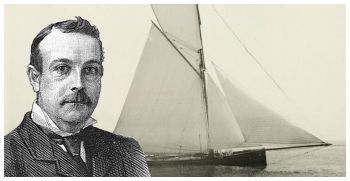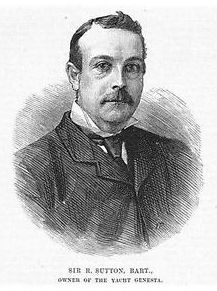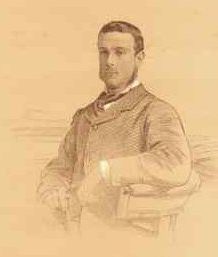Yves GARY Hits: 5876
Category: OWNERS
 Sir Richard Francis Sutton, 5th Baronet (20 December 1853 – 25 February 1891) was the owner of the racing yacht Genesta with which he raced the Puritan for the America's Cup in 1885.
Sir Richard Francis Sutton, 5th Baronet (20 December 1853 – 25 February 1891) was the owner of the racing yacht Genesta with which he raced the Puritan for the America's Cup in 1885.
He was married to Constance Corbet, daughter of Sir Vincent Corbet, Bt., and had a son (Sir Richard Vincent Sutton, 6th Baronet, see bellow) who succeeded him posthumously. He was Sheriff of Berkshire in 1887.
The Sutton Baronetcy, of Norwood Park in the County of Nottingham, was created in the Baronetage of Great Britain on 14 October 1772 for the politician Richard Sutton. He was the second surviving son of the distinguished diplomat Sir Robert Sutton. The latter was the grandson of Henry Sutton, brother of Robert Sutton, 1st Baron Lexinton. Hugh Clement Sutton (1867–1928), son of The Henry George Sutton, sixth son of the second Baronet, was a Major-General in the British Army. In the late 19th and early 20th century, the family seat was at Benham Place. However, the house was sold in 1982.
Sir Richard Vincent Sutton, 6th Baronet
Sutton fought as a Lieutenant in the First World War and was wounded in action in October 1914. He was one of the richest men in England, owning 13,000 acres (53 km2) and part of the West End in London. His engagement was announced in 1916. He was succeeded by his uncle. |
Genesta was a typical English cutter designed by John Beavor-Webb. Her frame was of steel, and she was planked with oak, being the first yacht of composite build to sail for the cup. He reached New York on July 16th, 1885, after a 22 day crossing, the fastest passage on record for a sailing yacht across the Atlantic. Sir Richard Sutton and John Beavor-Webb arrived a few days later.
Here is a first review for Sir Richard Sutton published before races by The New York Times August 31, 1885:
After the accident on September 8 in which Puritan was disqualified, American opinion on Sir Richard Sutton was no longer the same as evidenced by this article published by The New York Times September 10, 1885.
The fine showing of Genesta, and Sir Richard Sutton's broad sportsmanship, created a more friendly feeling in this country toward English yachtsmen than had previously existed.  We could afford to be generous after beating such a worthy opponent, while the conduct of Sir Richard in the incident of the foul won him the regard of all classes. His health was copiously drunk at a reception given in his honor September 24th, by the New York Yacht Club, and he was made an honorary member of the club.
We could afford to be generous after beating such a worthy opponent, while the conduct of Sir Richard in the incident of the foul won him the regard of all classes. His health was copiously drunk at a reception given in his honor September 24th, by the New York Yacht Club, and he was made an honorary member of the club.
After the Cup races, Sir Richard Sutton sailed some regattas organised on the East coast, aboard Genesta. He won the Brenton Reef Cup and the Cape May Challenge Cup, and brought them back to England with him.
After his return to England Sir Richard Sutton was engaged to a young lady who became seriously ill; he desired to sell Genesta but as he found no purchaser he raced her, but only a few times. Genesta won the first Round Britain Race that was held in 1887 to celebrate Queen Victoria's Jubilee. But by this time Irex had found herself and Genesta was outclassed.
Sir Richard gave up racing, selling Genesta; she was later converted to a yawl and was finally broken up in 1900. Sir Richard died of peritonitis on February 25, 1891. He was a spirited yachtsman and a good sportsman; it was unfortunate that his own ill health and that of his wife shortened his racing career. Genesta was one of the finest vessels which have competed for the America's Cup, and though she was defeated she was admired by all.

 USEFUL LINKS
USEFUL LINKS
- Sutton baronets - Wikipedia, the free encyclopedia
- Obituary: Sir Richard Sutton - The New York Times 26 February 1891, p. 4.
- SIR RICHARD SUTTON'S COURSE CRITICISED AS UNSPORTSMANLIKE - Front Page - NYTimes.com August 31, 1885
- PRAISE FROM EVERY SIDE; SIR RICHARD SUTTON'S GRACEFUL MAGNANIMITY. - Front Page - NYTimes.com September 10, 1885
